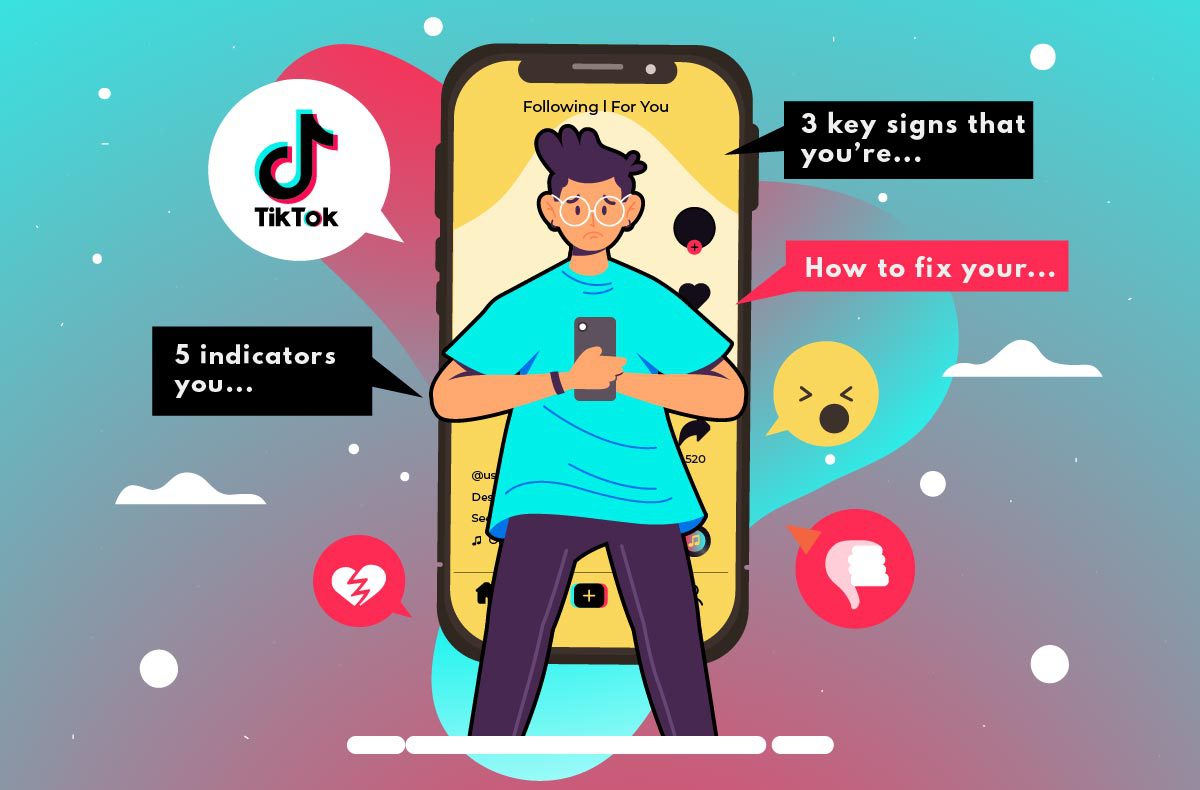
Illustration by Sarameeya Aree
Through an optimistic glance, TikTok has opened the doors to the conversation surrounding mental health by providing an open, unregulated platform for content sharing that is consumed by hundreds of millions of users across the globe. On a more sinister level, this has created confusion, spread misinformation, and created a counter-culture that is very much the antithesis of what trained mental health professionals aim to do: help people.
The endless videos of “expert” content creators and “professional” life coaches on the topic of mental health are staggering. Quick, quirky videos of a person nodding up and down and smiling simultaneously while pointing in random directions, where a flash-up of “facts” or “symptoms” are devoured. Abbreviated symptoms from the The Diagnostic and Statistical Manual of Mental Disorders (DSM-V) have been plastered throughout social media, with little or no background information. Interestingly enough, the DSM-V has 947 pages. Shockingly, hardly any of these pages make it to TikTok.
“Here are key signs that you’re being gaslighted.”
“Top 5 indicators you’re in a relationship with a narcissist.”
“If you see this image, you’ve experienced childhood trauma.”
The list of fast facts and fast-tracked diagnoses are endless.
Scroll —> Watch —> Like —> Comment —> Share. Oh, and don’t forget to hit the “subscribe” button!
While knowledge is power, knowledge misapplied is problematic, even dangerous. This is very much present, especially among young mothers and the entire world of parenting. If your child is not meeting every criterion on a brief TikTok video checklist, then there’s something wrong. The final “trust your intuition, Mama!” phrase is embedded in almost every caption.
ADHD, Autism, Oppositional Defiant Disorder, and other childhood emotional and developmental disorders are watered down to videos less than 60 seconds long, creating chaos through their untrained, unlicensed content solicited as medical factual knowledge.
“Rigid interests or constricted behaviors.”
“Vindictive and hostile behavior towards authority figures.”
“Has trouble organizing tasks and verbally interrupts frequently.”
The standard method of diagnosing, which is ruling out conditions and symptoms that overlap, is being ruled in through clever abbreviations, thus providing an ‘easy’ and accessible self-diagnosis that is masked by clinical language. This is where we see terminology that is used by clinicians but is being used in a misleading method of disseminating information.
What we are seeing on TikTok is fanning flames of pathology around normal symptoms of distress. This in turn either provides a sense of false security or further shames people away from seeking professional help. Accountability ends, other-blaming becomes standardized, and self-proclaimed experts are crowned with validity for professional medical advice.
A fallacy bubble in the name of freedom of speech and self-expression looms and hovers above, very much alive in the fear of cancel culture and social pressures of toxic positivity through the allowance of misuse of information.
While there may be a semblance of genuine interest in helping others through such videos due to self-experience, it doesn’t make it accurate or correct, especially in the field of clinical mental health. Discerning the difference between information that is helpful to know versus applicable in its form is muddled. Content can be masked as either assertive and authoritative or obnoxious and self-righteous, depending on how you squint.
Traditional diagnosis in psychology is a science. Psychometric assessments are rigorous with high internal validity, measuring cognitive abilities, aptitude, interpersonal and intrapersonal functioning, emotions, and behaviors. They are objective. They are measurable in their data, results, and interpretation.
Accuracy, validity, and precision are just one component of administration, scoring, and interpreting. Choosing the proper battery of tests and assessments is an area of expertise that requires years of training, practice, and supervision. This allows a diagnosis to be warranted, a treatment plan to be shared with other healthcare providers, and the patient to have knowledge about which treatment option is best suited for their needs. A thorough and proper battery maximizes the accuracy of prognosis and treatment plans.
In contrast, self-reporting assessments provide a subjective view of a very specific parameter of emotion or behavior in question. Self-assessments are rampant across TikTok videos. While these self-reporting tools are a great way to track and measure certain symptoms, behaviors, or emotions over time, it’s imperative to understand that they are not diagnostic tools, nor do they indicate interventions needed, whether it be through psycho-pharmacology or psychotherapy.
Rather, they do the exact opposite of what they may be intended for, which includes resistance or hesitation to reach out for professional help. After all, a TikTok content creator or brand generates far more views than reviews left for a mental health provider.
We all need healing. America is in a mental health crisis, with the most marginalized groups lacking access to routine, basic psychological needs. Children and adolescents are facing challenges that have never been experienced by prior generations. Technology has been a game-changer for every professional sector, which emphasizes the growing need for mental health, which is still battling a war of stigmatization.
TikTok, in all of its positives and negatives, has been shaping itself to be counterproductive for professional mental health practitioners, educators, and therapists who do want to share informative and accurate information, only to be drowned out by the unnecessary intrusion of influencers and content creators seeking self-mastery gloat.
In a country where one out of five Americans experiences a serious mental health illness, and twice as many suicides occur in rural areas, it’s time for our society to get serious about what kind of informative treatment we are making allowance for.